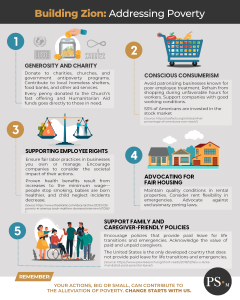Matthew Desmond, in his recent book Poverty, by America (Crown, 2023), explains extensively the ways that better-off Americans benefit, knowingly or unknowingly, from the poverty of our neighbors. Solving all the problems that the poor face may not be something that one individual or family can do. But, in addition to examining our attitudes toward the poor and needy, we can be generous with our resources, refuse as much as possible to take part in the societal practices that harm the poor, use the influence that we have to improve conditions for the poor, and support family-friendly and caregiver-friendly policies.
1. Be generous with our resources. Every penny donated to the Church’s fast offering and Humanitarian Aid funds goes to those in need, with nothing reserved for overhead. In addition, there are many charitable organizations doing good work that we can research and support with our contributions. Further, government antipoverty programs may not be perfectly efficient or successful, but they do alleviate the suffering of many people, and we can pay our fair share of taxes to support them. We can even consider that continually cutting these programs hurts the people who need them without meaningfully reducing government spending or reining in the deficit and ask our representatives to find other ways—such as increasing fairness in the tax system—to achieve those laudable goals.
Each of us is bothered by the sight of a homeless person or family, and we are reminded that Jesus described Himself as having “not where to lay his head” (Matthew 8:20; Luke 9:58). Those who are forced to beg may make us feel uncomfortable and guilty for not being able to help more, although we can feel better knowing that we are contributing time, money, or both to the local homeless shelter, food bank, and similar services that help those suffering from poverty.
By doing this, we are “succor[ing] those who stand in need of [our] succor; … administer[ing] of our substance unto [those] that stand … in need” and are not suffering beggars to put up their petitions to us in vain (Mosiah 4:16). Those of us who interact with people who are begging for money can carry gift certificates to fast food restaurants and give them away; we may feel prompted at times to give cash or invite a person asking for money to join us at a nearby restaurant for a meal. Remember that few to no cash benefits are available to the poor, and think of how many necessities cannot be obtained without cash—clothes, shoes, coins for the laundromat, bus fare, laundry detergent, toothpaste, household cleaners, period items, baby diapers, toilet paper. These items are not covered by food stamps—something to consider when purchasing things for the next food drive in your neighborhood because food banks desperately need them. Encourage corporations to be good citizens.
2. Consider how our practices are affecting the working poor. In a chapter in Poverty, By America on “how we undercut workers,” Desmond details the practices that many employers use to take advantage of workers in low-wage jobs—not only the low wages but also non-compete agreements, nonpayment of benefits such as health insurance or sick leave, and classifying workers as temporary or as independent contractors so they need not pay benefits, follow labor-protection laws, or pay into workers compensation insurance funds. In addition, corporations invest heavily in lobbying against increases to the minimum wage, even though such increases result in proven health benefits—people stop smoking, babies are born healthier, and child neglect incidents decrease. Some companies evade taxes or break laws intended to allow workers to organize and bargain collectively. Although labor unions, like any organization, can be vulnerable to corruption and abuse, they also can balance power between employers and employees and serve a public health interest. The decline of labor unions has had negative effects on middle- and working-class Americans.
Further, many employers use algorithms and software to monitor workers so intensively that they are expected to reach inhumane productivity goals. Similarly, widespread “just-in-time” scheduling practices require workers to hold open all their time to work without guaranteeing them a set number of hours (and thus the ability to predict their incomes) or allowing them to plan for education, another job, childcare, or family time.
The system of low-wage jobs in the United States, which provides most of us with the fast and cheap products and services that we demand, is based on a huge government subsidy to employers who are able to avoid paying a living wage because their employees receive food stamps, the Child Tax Credit, the Earned Income Tax Credit, Medicaid, and other government benefits. These programs (which, as we have seen, are being cut) are not so much a handout to the poor as they are a handout to the employers who are then able to pay substandard wages and provide no benefits to their employees.
We may not be able to change these kinds of employment practices, but we can do what we can to discourage them or refrain from participating in them. For example, we can avoid patronizing businesses that have reputations for treating their employees poorly, opposing increases to the minimum wage, or undermining employee attempts to organize so they can bargain collectively.
We can think carefully about patronizing businesses when their workers probably should be at home with their families, such as late at night, on Sundays, or on major holidays. We can avoid shopping at Black Friday sales when employees have been required to work late on the night of Thanksgiving Day or in the very early hours of Black Friday to prepare for an influx of shoppers before dawn. We can also consider whether we really need “next day” or “two-day” deliveries when the packers and delivery workers have been required to work toward extreme production goals to fill those orders.
We will face emergencies when we need to patronize businesses late at night or on Sunday or when we need a product as soon as possible. And those Black Friday sales and similar practices that exploit workers will still go on. But we can be more thoughtful about whether we want or need to contribute to those practices.
We can all try to support companies that treat their employees well. Journalists and others do the public a great service when they report which companies have good working conditions and policies so that we can choose to support those companies with our consumer dollars and financial investments. Just as there are charity-rating websites that allow us to assess which nonprofit organizations are using donations wisely, there are some websites that seek to hold corporations accountable in relation to public and environmental health and anti-poverty efforts. These include Donegood, Buycott, B Lab, Fairtrade, and Corporate Knights, but there could be much more information about which companies have the most humane working conditions and other sustainable practices throughout their supply chains.
We can also deal kindly and respectfully with those who serve us as they work. Many servers in restaurants and cashiers in stores are expected to move diners or customers through at an efficient rate. They may not have time to chat with customers as seemed common in the “good old days.” They may not seem willing to help when we insist on exceptions to rules and policies they had no part in making and are not allowed to flaunt. They likely will not respond favorably or with a sense of humor when a customer flirts or seems overly familiar or disrespectful. We can avoid being offended when another person is not able to meet these kinds of expectations but still provides the service we need.
If we are among those demanding customers, we may also be tempted to punish an “unfriendly” worker by failing to leave a tip or even complaining to management. We can remember that often, people who are working for tips are being paid less than minimum wage and that there are no states where the minimum wage approaches a living wage, so they depend on tips to live. We can remember how difficult it may be for retail, food service, or other low-wage workers to gather the internal resources to be especially cordial, much less subservient, at all times. And we can remember that how we treat those whom we will likely never see again says more about our characters than it does about the quality of their work.
3. Use the influence that we have in setting working conditions. Those among us who own or manage businesses or hire people to work in our homes can affect how workers are treated in those jobs. Research indicates that “when workers are treated well, they work harder and more productively, delivering value to investors and customers alike.” Further, employers can be careful to follow the existing labor laws, paying the minimum wage (at least) and not asking or allowing employees to work “off the clock” or forgo mandatory overtime wages. Employers can also guarantee their workers a predictable number of hours and avoid the use of “just-in-time” scheduling practices that require workers to keep all their time open for employment or productivity monitoring systems that require superhuman effort and don’t take human variability or needs into account.
Many of us (about 53 percent, according to poverty researcher Matthew Desmond) are invested in the stock market through retirement plans and other investments. Corporations exist to make a profit, which is not in itself a bad thing, but problems arise when businesses exist only to make a profit, as though they have no responsibilities to the people who work for them, consumers of their products, the communities where they are located, or the societies that make it possible for them to operate. It is a recent myth that corporations should act only with the benefit of their shareholders in mind and need not consider the impact of their actions on families, communities, and society in general. And although many corporations fund foundations that do a great deal of good, often the same businesses do not seem to consider how they treat employees, consumers, the environment, and society as they acquire the riches necessary to later be able to fund their generosity. As shareholders, we can use what leverage we have to encourage corporations to be good citizens.
Some investment products have a plan where the investor can choose not to have stocks in their portfolio of companies that do harmful things—such as manufacture tobacco or alcohol products, grow recreational marijuana, promote gambling, manufacture weapons, or harm the environment. If such a portfolio is available, we could consider switching to it.
President N. Eldon Tanner spoke of the necessity of integrity in business:
What of the business world and integrity? Business leaders and financiers should be the very epitome of integrity. Fortunately, most of them are—but when we learn of wide-scale bribery, fraud, cheating, deceit, and power plays to gain control of vast financial empires; when we have to legislate to make our dealings with one another honest and prevent one group from taking undue advantage of another, we know that integrity is lacking. If it were not, businesses could operate more successfully, employees would be more honest in their performance, and the products of their labor would not be inferior or shoddy.
4. Use the influence we have in establishing better conditions for housing. Those of us who own or manage rental housing can ensure that the premises are cared for and that repairs are made when needed as efficiently as possible. We can avoid asking others to live in conditions or under terms that we would not accept for ourselves or our families. We can help tenants by not charging higher rent than is necessary to meet obligations in connection with the property, manage it wisely, and secure a reasonable income from it. Landlords and property managers who take time to develop cordial relationships with their tenants may create a mutual respect that can smooth out differences. Tenants who are late in making their rent payments should be asked why, and if a valid emergency arises, could be allowed to make a payment on a later schedule. We all, at times, face circumstances when an act of kindness or a willingness to be flexible will make the difference between a difficulty and an emergency.
One of the practices that negatively affects the availability of affordable housing in the United States is the use of exclusionary zoning laws, which keep multifamily apartment complexes or affordable single-family homes out of neighborhoods zoned for more expensive single-family homes. Ending these zoning practices would go far in ending the segregation of neighborhoods and schools that prevails in the United States. This would lead to the integration of races and classes in our wards, stakes, schools, parks, neighborhoods, and communities. Imagine the positive impact this would have on the Church, where so many of us are denied the privilege of becoming neighbors and friends with many of God’s children who are strangers and foreigners to us now, even though they are of the same household of God (see Ephesians 2:19). If we are to love others as Jesus Christ loves them, we need to get to know them, serve beside them, care about their problems, share their joys, and give them the same opportunities, benefits, and blessings that those who live in high-opportunity neighborhoods enjoy now.
5. Support family-friendly and caregiver/homemaker-friendly policies. The United States is the only developed country that does not provide paid leave for employees who face the predictable transitions and necessities of life, such as our own illnesses or the need to care for an ill family member or a new baby—times when life must take priority over work. Although some employers provide that kind of leave, the need is universal.
We should open our hands wide.
We can begin to value caregiving efforts close to home by recognizing and helping caregivers. If a family caregiver is shouldering most of the burden of care, we can discuss with them what we can do to help them through fairly sharing the temporal, emotional, physical, and financial burdens of care and the need for respite. In our wards, we can be aware of the needs of those who are giving care and acknowledge their service, provide respite, and do what we can to be sure they and those for whom they care are not isolated or forgotten, especially if we are assigned to minister to them or have stewardship over them.
As employers, we can acknowledge the needs of employees to care for their families and participate in family life. We can allow leave—ideally, paid leave—for those who need it whenever possible.
As a society, we can recognize that participation in family life strengthens society, families, and individuals. Caregivers, paid or unpaid, and those for whom they care could be recognized as a significant part of the economy and their needs met, perhaps through health insurance, paid family leave, tax policies, and labor policies.
Our willingness to take steps to help the poor and needy as we have been commanded by God may involve habitually asking the question, “Who is my neighbor?” and remembering the answer, “He that showed mercy” on the person who needed help (see Luke 10:25–37). We may need to be more creative in examining how our actions are affecting our neighbors among the less fortunate. Nowhere does the Lord ask us to assess who is deserving of our mercy; that mercy is asked for or needed is the motivating factor. And in response to those needs, as commanded in Deuteronomy 15:7–8, we should open our hands wide.

















